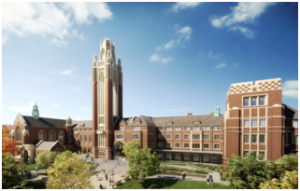
University of Chicago: Learning A Second Language Can Help Learning
A recent study conducted by the University of Chicago showed that over and above all these learning benefits, bilingualism helps individuals cope in the modern world. Along with being able to comprehend information at a faster rate and being able to solve problems, bilingualism also significantly increases one’s ability to multi-task and to make effective decisions. The University of Chicago says that this is because learning a second language is more rational whereas your mother tongue is more linked to emotion—the second language helps slow down knee-jerk reactions and allows one to take their time to contemplate choices. Sayuri Hayakawa, one of the lead researchers, says that this is very important information especially for college students who are often both extremely emotional and faced with a wide array of decisions. More studies and programs are currently being conducted by the University of Chicago, around which it means to base future programs to boost student performance.
 A lot of evidence has also surfaced to back this up. Recent studies conducted by the Department of Education in tandem with the Department of Health show that learning a second language can help learning. Aside from having multiple practical benefits like being able to navigate through a foreign country, being able to socialize globally and having the ability to outdo most people when it comes to basic trivia questions, a recent study by the Journal of Neuroscience that is being adapted in the US Common Core for pre-school showed that being bilingual also affects students’ ability to learn new concepts as well as to retain schema. The study showed that learning a second language from the age of 7 and below helps build an individual’s default cognitive flexibility whereas becoming bilingual from the ages 8 and up helps improve and expand one’s already existing ability to learn. This new knowledge is being utilized mostly in the pre-school realm but will soon be expanded into the grade school curriculum as well. Most high schools already implement second language classes.
A lot of evidence has also surfaced to back this up. Recent studies conducted by the Department of Education in tandem with the Department of Health show that learning a second language can help learning. Aside from having multiple practical benefits like being able to navigate through a foreign country, being able to socialize globally and having the ability to outdo most people when it comes to basic trivia questions, a recent study by the Journal of Neuroscience that is being adapted in the US Common Core for pre-school showed that being bilingual also affects students’ ability to learn new concepts as well as to retain schema. The study showed that learning a second language from the age of 7 and below helps build an individual’s default cognitive flexibility whereas becoming bilingual from the ages 8 and up helps improve and expand one’s already existing ability to learn. This new knowledge is being utilized mostly in the pre-school realm but will soon be expanded into the grade school curriculum as well. Most high schools already implement second language classes.
This benefit also extends over a long period of time. The same study concluded that bilingual adults aged more gracefully. A separate study backs this up: in the 1950s, a test was done on school-aged children who spoke more than one language (mostly the children of migrants from foreign countries)—recently, the participants, now in their 70s were tested again for the same things. They were able to retain a lot of information which they took up in high school and college and only a minimal percentage were afflicted with dementia. While learning a second language may not be able to keep the effects of aging away permanently, it can delay it for a significant amount of time. This information is being used both by the educational and the health community.
Another study, this time conducted by the Psychological Science Journal showed that bilingual people are able to read faster and have a faster comprehension rate. Using eye movement tests, they were able to see that bilinguals spent less time reading and thoroughly understanding different paragraphs—most especially when a lot of words in the paragraph meant the same thing in both languages. For example, the word sport in English and Dutch. A brain scan also showed that bilinguals don’t just learn faster, they also use up less energy doing so because their synapses have been conditioned to learn at a moment’s notice.
The International Journal of Bilingualism recently published a study that is currently the basis of programs being developed for American schools. The study had 121 participants and were asked to solve the same math problems, identify the same abstract patterns (abstract reasoning test) and answer numeral sequencing items. The results showed that bilingual kids had better problem solving skills, regardless of how old they were and at what age they learned the language. Although as a general rule, earlier is better, studies are showing that learning a second language can benefit education no matter what age people start learning.
 + 1-888-827-0150
+ 1-888-827-0150 + 44-20-3006-2750
+ 44-20-3006-2750









